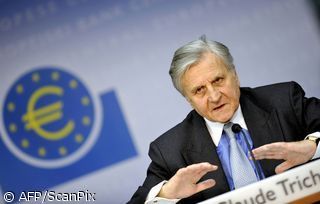Poland has received a dressing down from the European Commission
Published:
20 February 2005 y., Sunday
The EC says Poland needs to be more aggressive with its fiscal adjustment if it wants to enter the eurozone.
The response came after Poland presented an updated version of its convergence program, known as the Hausner plan, after Deputy Prime Minister Jerzy Hausner, that was markedly less ambitious than the original version. It sets out a gradual reduction of the budget deficit from 5.4 percent of GDP in 2004 to 2.2 percent by 2007. In the original plan, the budget deficit was planned to be just 1.5 percent of GDP by 2007.
These new figures are based upon real GDP growth of 4.9 percent on average in 2005 and 2006, down from 5.7 percent in 2004. In 2007 the economy is predicted to rebound with a 5.6 percent growth in GDP, something which analysts remain skeptical about.
In order to meet the criteria for entry to the EU, Poland would have to fully implement the comprehensive measures contained within the Hausner plan. This would mean a 4.7 percent impact on GDP for 2005-2007 and, although Poland has satisfied Brussels that it can correct the budget deficit in the short term, the risky strategy leaves many obstacles to getting the deficit below three percent of GDP by 2009, a key requirement for entering the single currency. EC officials also criticized the government's lack of specific steps to secure a long-term balance of public finances.
However, the Polish government remained resolute in the face of the EC critique. "Poland will enter the eurozone in 2009," Hausner asserted. "The government maintains its convergence plan. I know nothing about any change of the government stance." Addressing the EC, Hausner said: "Your anxiety is understandable, but we do what we think is proper. Stop worrying unnecessarily."
Šaltinis:
Warsaw Business Journal
Copying, publishing, announcing any information from the News.lt portal without written permission of News.lt editorial office is prohibited.
The most popular articles
 The European Commission has authorised under EU state aid rules a €550 million capital injection and a €400 million guarantee in favour of the Austrian bank BAWAG. P.S.K. The Commission found the measures to be in line with EU state aid rules.
more »
The European Commission has authorised under EU state aid rules a €550 million capital injection and a €400 million guarantee in favour of the Austrian bank BAWAG. P.S.K. The Commission found the measures to be in line with EU state aid rules.
more »
 EUROSTAT has reported that the sharpest annual decrease in hourly labour costs of -10.9% was observed in Lithuania in the 3rd quarter of 2009.
more »
EUROSTAT has reported that the sharpest annual decrease in hourly labour costs of -10.9% was observed in Lithuania in the 3rd quarter of 2009.
more »
 Statistics Lithuania informs that, according to the Labour Force Survey data, the number of the unemployed in III quarter 2009 made 228.1 thousand.
more »
Statistics Lithuania informs that, according to the Labour Force Survey data, the number of the unemployed in III quarter 2009 made 228.1 thousand.
more »
 What has come to be termed as the "Great Recession" seems to have come to an end in the third quarter of 2009.
more »
What has come to be termed as the "Great Recession" seems to have come to an end in the third quarter of 2009.
more »
 The European Commission has authorised, under EU State aid rules, a measure adopted by Lithuania to limit the adverse impact of the current financial crisis on exporting firms.
more »
The European Commission has authorised, under EU State aid rules, a measure adopted by Lithuania to limit the adverse impact of the current financial crisis on exporting firms.
more »
 The schedule of Vilnius International Airport (VIA) is supplemented with 3 more new directions; the airline company airBaltic starts regular flights to Paris today, to Munich tomorrow, and to Berlin on Monday.
more »
The schedule of Vilnius International Airport (VIA) is supplemented with 3 more new directions; the airline company airBaltic starts regular flights to Paris today, to Munich tomorrow, and to Berlin on Monday.
more »
 The Governing Council of the European Central Bank (ECB) has decided to start the main construction works for its new premises in spring 2010.
more »
The Governing Council of the European Central Bank (ECB) has decided to start the main construction works for its new premises in spring 2010.
more »
 AB Bank SNORAS was granted the award from NASDAQ OMX Baltic Stock Exchange for the jubilee 15-year listing of the bank’s shares on NASDAQ OMX Vilnius Stock Exchange.
more »
AB Bank SNORAS was granted the award from NASDAQ OMX Baltic Stock Exchange for the jubilee 15-year listing of the bank’s shares on NASDAQ OMX Vilnius Stock Exchange.
more »
 Parex banka has established a subsidiary, SIA NIF, which will professionally manage assets that are not related to the Bank’s core business.
more »
Parex banka has established a subsidiary, SIA NIF, which will professionally manage assets that are not related to the Bank’s core business.
more »
 Mariann Fischer Boel, European Commissioner for Agriculture and Rural Development, today put forward a plan to ensure that Greece will put in place the systems necessary to allow EU aid payments to be made to farmers.
more »
Mariann Fischer Boel, European Commissioner for Agriculture and Rural Development, today put forward a plan to ensure that Greece will put in place the systems necessary to allow EU aid payments to be made to farmers.
more »